University of Tasmania BMA250: Social Responsibility Case Study
VerifiedAdded on 2023/06/11
|9
|2278
|320
Case Study
AI Summary
This assignment presents a detailed analysis of a case study concerning managerial social responsibility, specifically addressing ethical dilemmas and corporate social responsibility (CSR) perspectives. It examines Friedman's and Freeman's contrasting views on CSR, the issues arising from employee monitoring, and strategies to prevent malicious outcomes while respecting employee privacy. The analysis includes discussions on shareholder versus stakeholder approaches and the moral obligations of companies in generating profit while minimizing harm. The document also explores the complexities of balancing business goals with legal and ethical standards, emphasizing the importance of transparency and clear communication of company policies regarding employee monitoring. Desklib offers this document as a resource for students studying business ethics and social responsibility, providing a comprehensive understanding of the subject matter.
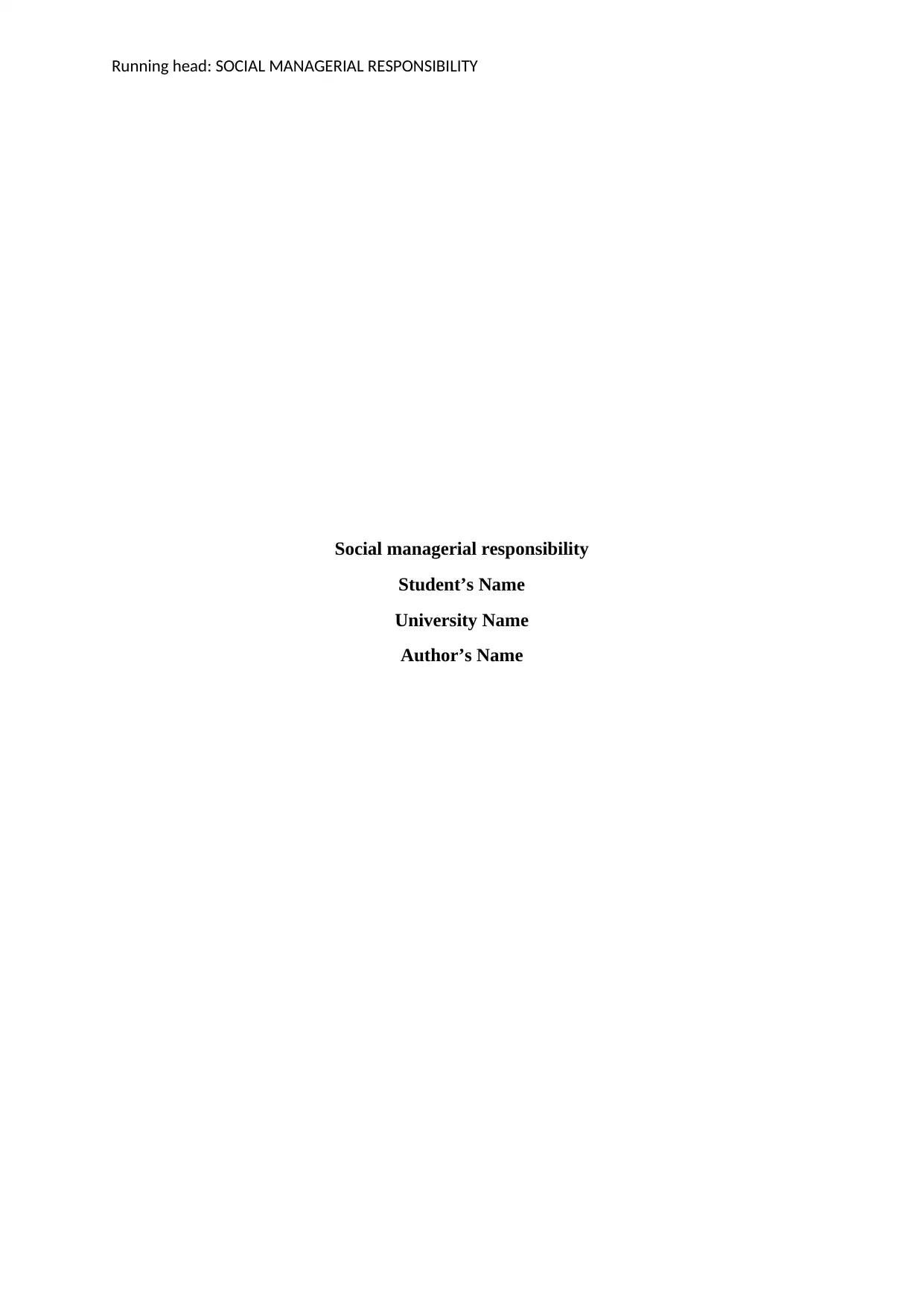
Running head: SOCIAL MANAGERIAL RESPONSIBILITY
Social managerial responsibility
Student’s Name
University Name
Author’s Name
Social managerial responsibility
Student’s Name
University Name
Author’s Name
Paraphrase This Document
Need a fresh take? Get an instant paraphrase of this document with our AI Paraphraser
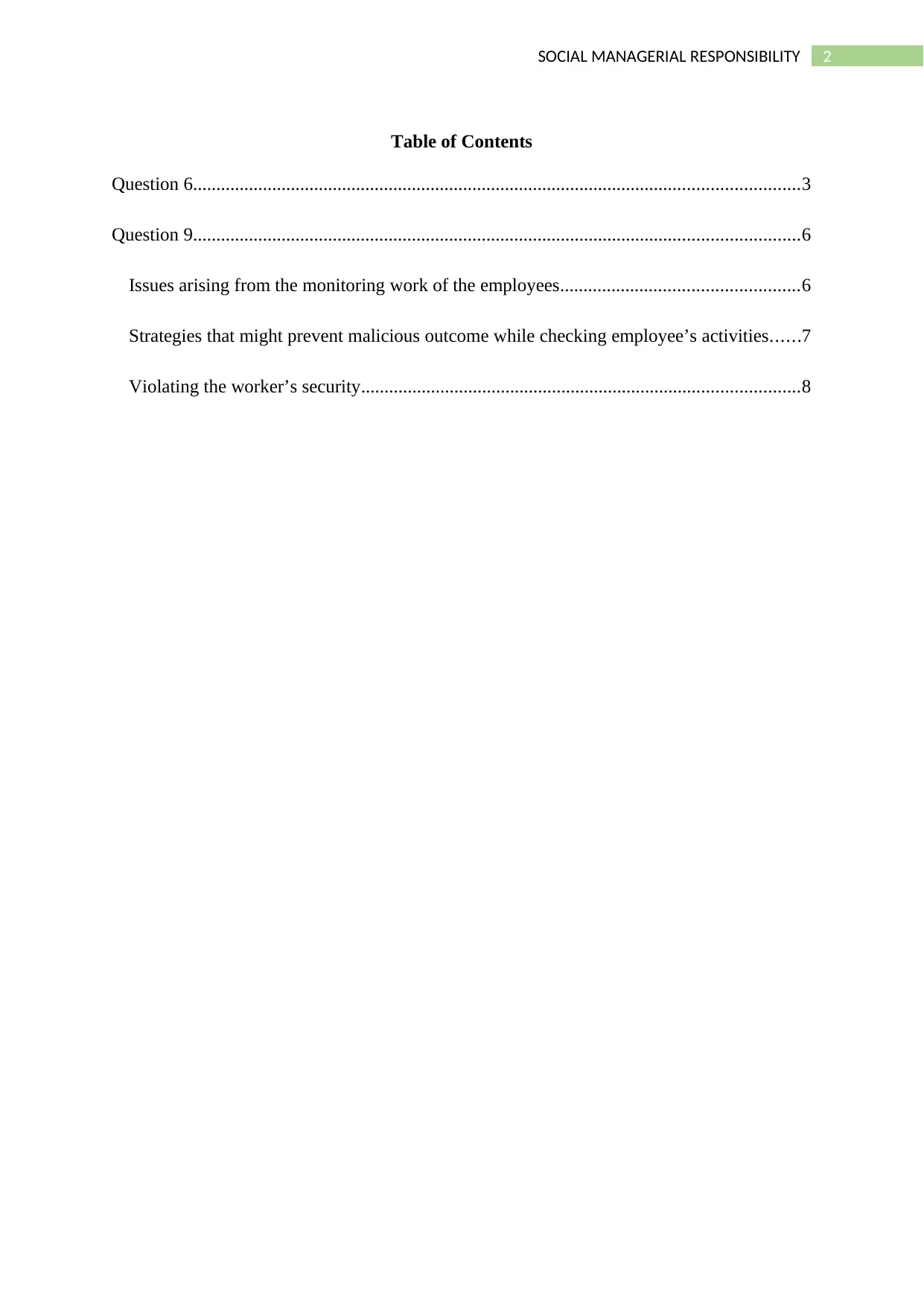
2SOCIAL MANAGERIAL RESPONSIBILITY
Table of Contents
Question 6..................................................................................................................................3
Question 9..................................................................................................................................6
Issues arising from the monitoring work of the employees...................................................6
Strategies that might prevent malicious outcome while checking employee’s activities......7
Violating the worker’s security..............................................................................................8
Table of Contents
Question 6..................................................................................................................................3
Question 9..................................................................................................................................6
Issues arising from the monitoring work of the employees...................................................6
Strategies that might prevent malicious outcome while checking employee’s activities......7
Violating the worker’s security..............................................................................................8

3SOCIAL MANAGERIAL RESPONSIBILITY
Question 6
CSR can be termed as an initiative o0n the part of the company to make a successful
evaluation alongside taking the liability of the effect of the company on the wellbeing of the
society and the environment. Corporate social responsibility is a concept that is in
straightway linked with the approaches and the responsibilities undertaken by the company
going much beyond the parameters set by the environment protection agencies and other
regulatory authorities. Empirical literature findings reveals that since 2010, a lot of
discussions have taken place regarding the CSR activities of the companies. Unique opinions
have been put forward by Milton Friedman and E. Friedman regarding the kind of
responsibilities that the organisations should take up during their CSR activities, and in
alignment to such responsibilities what should be the goals that the companies should set.
Many of the opinion and views that have been presented in this regard are in sharp contrast to
each other. Freeman has showed continued support towards the Stakeholder Theory and has
opined in lines of the theory. He opines that any single authority who have a distinct claim in
the matters of the organisation has all rights to receive treatment as a determining factor
towards any of the prospects of the organisation. However, Friedman’s opinion stands as a
counteracting viewpoint. He is of the opinion that any of the concerned persons who does not
have any stage in the ownership of the company are supposed to be bereaved of any form of
voluntary responsibility undertaken by the organisation.
In sharp contrast, Milton Friedman puts forward a stakeholder approach in lieu of the
matters of CSR duties accountable to the organisation. In context of the CSR activities, the
shareholders play the role of the major financial drivers of the organisation. Hence, the
complete share of the social responsibility of the company is to be enjoyed by the
embodiment comprising of the shareholders. In this context, the concern of the company
should bear the responsibility of the company’s executives is to make optimal profits and
Question 6
CSR can be termed as an initiative o0n the part of the company to make a successful
evaluation alongside taking the liability of the effect of the company on the wellbeing of the
society and the environment. Corporate social responsibility is a concept that is in
straightway linked with the approaches and the responsibilities undertaken by the company
going much beyond the parameters set by the environment protection agencies and other
regulatory authorities. Empirical literature findings reveals that since 2010, a lot of
discussions have taken place regarding the CSR activities of the companies. Unique opinions
have been put forward by Milton Friedman and E. Friedman regarding the kind of
responsibilities that the organisations should take up during their CSR activities, and in
alignment to such responsibilities what should be the goals that the companies should set.
Many of the opinion and views that have been presented in this regard are in sharp contrast to
each other. Freeman has showed continued support towards the Stakeholder Theory and has
opined in lines of the theory. He opines that any single authority who have a distinct claim in
the matters of the organisation has all rights to receive treatment as a determining factor
towards any of the prospects of the organisation. However, Friedman’s opinion stands as a
counteracting viewpoint. He is of the opinion that any of the concerned persons who does not
have any stage in the ownership of the company are supposed to be bereaved of any form of
voluntary responsibility undertaken by the organisation.
In sharp contrast, Milton Friedman puts forward a stakeholder approach in lieu of the
matters of CSR duties accountable to the organisation. In context of the CSR activities, the
shareholders play the role of the major financial drivers of the organisation. Hence, the
complete share of the social responsibility of the company is to be enjoyed by the
embodiment comprising of the shareholders. In this context, the concern of the company
should bear the responsibility of the company’s executives is to make optimal profits and
⊘ This is a preview!⊘
Do you want full access?
Subscribe today to unlock all pages.

Trusted by 1+ million students worldwide
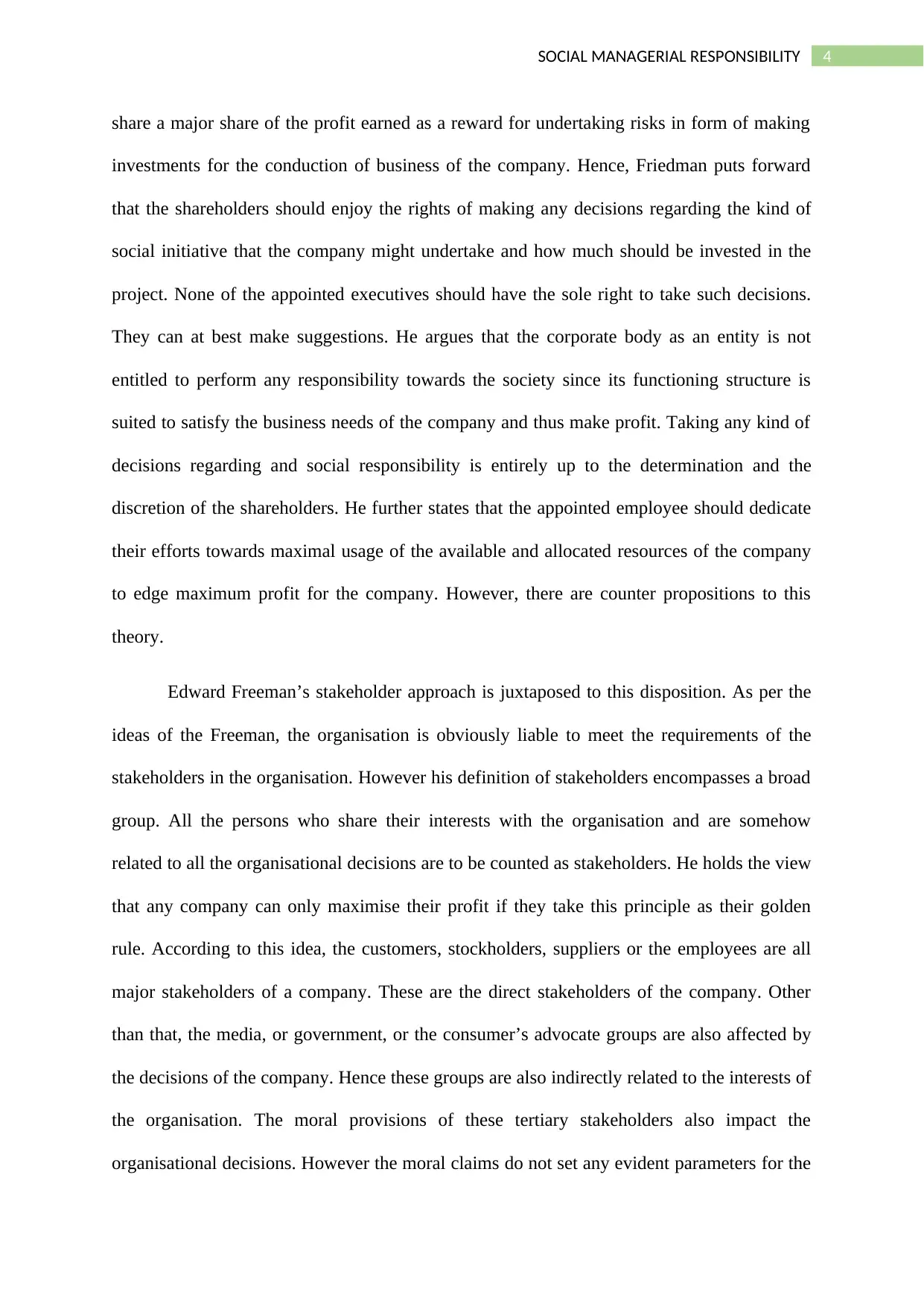
4SOCIAL MANAGERIAL RESPONSIBILITY
share a major share of the profit earned as a reward for undertaking risks in form of making
investments for the conduction of business of the company. Hence, Friedman puts forward
that the shareholders should enjoy the rights of making any decisions regarding the kind of
social initiative that the company might undertake and how much should be invested in the
project. None of the appointed executives should have the sole right to take such decisions.
They can at best make suggestions. He argues that the corporate body as an entity is not
entitled to perform any responsibility towards the society since its functioning structure is
suited to satisfy the business needs of the company and thus make profit. Taking any kind of
decisions regarding and social responsibility is entirely up to the determination and the
discretion of the shareholders. He further states that the appointed employee should dedicate
their efforts towards maximal usage of the available and allocated resources of the company
to edge maximum profit for the company. However, there are counter propositions to this
theory.
Edward Freeman’s stakeholder approach is juxtaposed to this disposition. As per the
ideas of the Freeman, the organisation is obviously liable to meet the requirements of the
stakeholders in the organisation. However his definition of stakeholders encompasses a broad
group. All the persons who share their interests with the organisation and are somehow
related to all the organisational decisions are to be counted as stakeholders. He holds the view
that any company can only maximise their profit if they take this principle as their golden
rule. According to this idea, the customers, stockholders, suppliers or the employees are all
major stakeholders of a company. These are the direct stakeholders of the company. Other
than that, the media, or government, or the consumer’s advocate groups are also affected by
the decisions of the company. Hence these groups are also indirectly related to the interests of
the organisation. The moral provisions of these tertiary stakeholders also impact the
organisational decisions. However the moral claims do not set any evident parameters for the
share a major share of the profit earned as a reward for undertaking risks in form of making
investments for the conduction of business of the company. Hence, Friedman puts forward
that the shareholders should enjoy the rights of making any decisions regarding the kind of
social initiative that the company might undertake and how much should be invested in the
project. None of the appointed executives should have the sole right to take such decisions.
They can at best make suggestions. He argues that the corporate body as an entity is not
entitled to perform any responsibility towards the society since its functioning structure is
suited to satisfy the business needs of the company and thus make profit. Taking any kind of
decisions regarding and social responsibility is entirely up to the determination and the
discretion of the shareholders. He further states that the appointed employee should dedicate
their efforts towards maximal usage of the available and allocated resources of the company
to edge maximum profit for the company. However, there are counter propositions to this
theory.
Edward Freeman’s stakeholder approach is juxtaposed to this disposition. As per the
ideas of the Freeman, the organisation is obviously liable to meet the requirements of the
stakeholders in the organisation. However his definition of stakeholders encompasses a broad
group. All the persons who share their interests with the organisation and are somehow
related to all the organisational decisions are to be counted as stakeholders. He holds the view
that any company can only maximise their profit if they take this principle as their golden
rule. According to this idea, the customers, stockholders, suppliers or the employees are all
major stakeholders of a company. These are the direct stakeholders of the company. Other
than that, the media, or government, or the consumer’s advocate groups are also affected by
the decisions of the company. Hence these groups are also indirectly related to the interests of
the organisation. The moral provisions of these tertiary stakeholders also impact the
organisational decisions. However the moral claims do not set any evident parameters for the
Paraphrase This Document
Need a fresh take? Get an instant paraphrase of this document with our AI Paraphraser
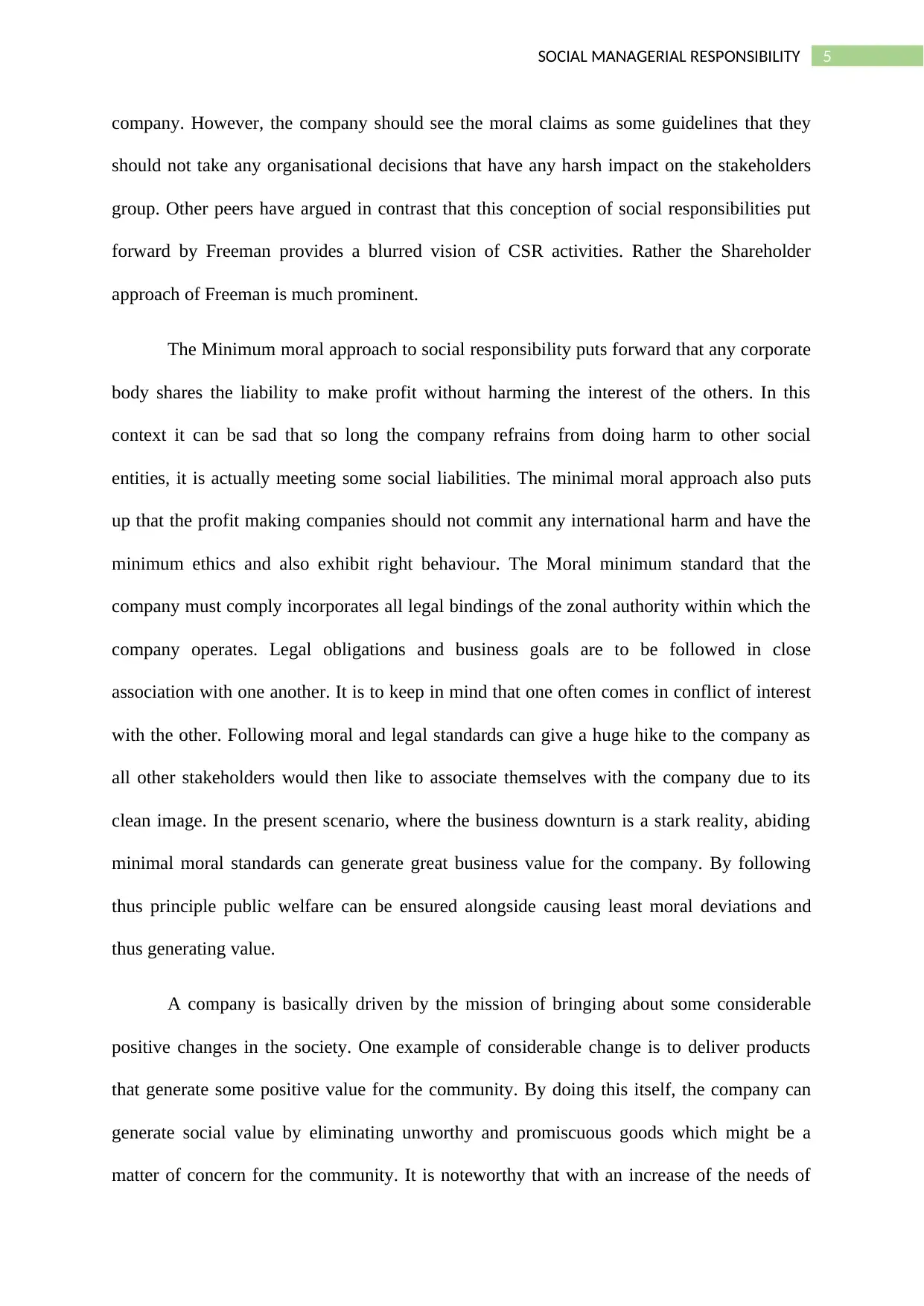
5SOCIAL MANAGERIAL RESPONSIBILITY
company. However, the company should see the moral claims as some guidelines that they
should not take any organisational decisions that have any harsh impact on the stakeholders
group. Other peers have argued in contrast that this conception of social responsibilities put
forward by Freeman provides a blurred vision of CSR activities. Rather the Shareholder
approach of Freeman is much prominent.
The Minimum moral approach to social responsibility puts forward that any corporate
body shares the liability to make profit without harming the interest of the others. In this
context it can be sad that so long the company refrains from doing harm to other social
entities, it is actually meeting some social liabilities. The minimal moral approach also puts
up that the profit making companies should not commit any international harm and have the
minimum ethics and also exhibit right behaviour. The Moral minimum standard that the
company must comply incorporates all legal bindings of the zonal authority within which the
company operates. Legal obligations and business goals are to be followed in close
association with one another. It is to keep in mind that one often comes in conflict of interest
with the other. Following moral and legal standards can give a huge hike to the company as
all other stakeholders would then like to associate themselves with the company due to its
clean image. In the present scenario, where the business downturn is a stark reality, abiding
minimal moral standards can generate great business value for the company. By following
thus principle public welfare can be ensured alongside causing least moral deviations and
thus generating value.
A company is basically driven by the mission of bringing about some considerable
positive changes in the society. One example of considerable change is to deliver products
that generate some positive value for the community. By doing this itself, the company can
generate social value by eliminating unworthy and promiscuous goods which might be a
matter of concern for the community. It is noteworthy that with an increase of the needs of
company. However, the company should see the moral claims as some guidelines that they
should not take any organisational decisions that have any harsh impact on the stakeholders
group. Other peers have argued in contrast that this conception of social responsibilities put
forward by Freeman provides a blurred vision of CSR activities. Rather the Shareholder
approach of Freeman is much prominent.
The Minimum moral approach to social responsibility puts forward that any corporate
body shares the liability to make profit without harming the interest of the others. In this
context it can be sad that so long the company refrains from doing harm to other social
entities, it is actually meeting some social liabilities. The minimal moral approach also puts
up that the profit making companies should not commit any international harm and have the
minimum ethics and also exhibit right behaviour. The Moral minimum standard that the
company must comply incorporates all legal bindings of the zonal authority within which the
company operates. Legal obligations and business goals are to be followed in close
association with one another. It is to keep in mind that one often comes in conflict of interest
with the other. Following moral and legal standards can give a huge hike to the company as
all other stakeholders would then like to associate themselves with the company due to its
clean image. In the present scenario, where the business downturn is a stark reality, abiding
minimal moral standards can generate great business value for the company. By following
thus principle public welfare can be ensured alongside causing least moral deviations and
thus generating value.
A company is basically driven by the mission of bringing about some considerable
positive changes in the society. One example of considerable change is to deliver products
that generate some positive value for the community. By doing this itself, the company can
generate social value by eliminating unworthy and promiscuous goods which might be a
matter of concern for the community. It is noteworthy that with an increase of the needs of
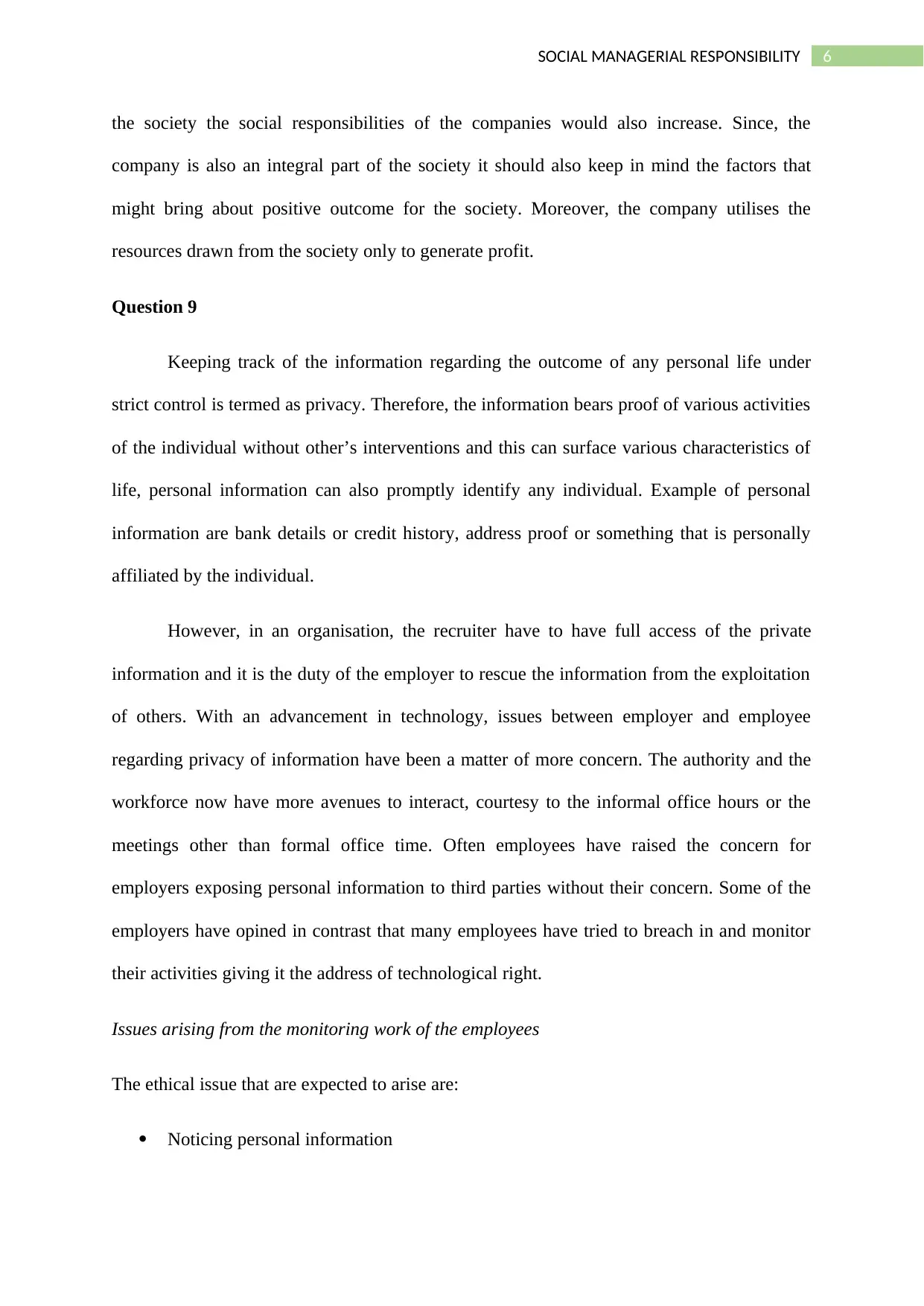
6SOCIAL MANAGERIAL RESPONSIBILITY
the society the social responsibilities of the companies would also increase. Since, the
company is also an integral part of the society it should also keep in mind the factors that
might bring about positive outcome for the society. Moreover, the company utilises the
resources drawn from the society only to generate profit.
Question 9
Keeping track of the information regarding the outcome of any personal life under
strict control is termed as privacy. Therefore, the information bears proof of various activities
of the individual without other’s interventions and this can surface various characteristics of
life, personal information can also promptly identify any individual. Example of personal
information are bank details or credit history, address proof or something that is personally
affiliated by the individual.
However, in an organisation, the recruiter have to have full access of the private
information and it is the duty of the employer to rescue the information from the exploitation
of others. With an advancement in technology, issues between employer and employee
regarding privacy of information have been a matter of more concern. The authority and the
workforce now have more avenues to interact, courtesy to the informal office hours or the
meetings other than formal office time. Often employees have raised the concern for
employers exposing personal information to third parties without their concern. Some of the
employers have opined in contrast that many employees have tried to breach in and monitor
their activities giving it the address of technological right.
Issues arising from the monitoring work of the employees
The ethical issue that are expected to arise are:
Noticing personal information
the society the social responsibilities of the companies would also increase. Since, the
company is also an integral part of the society it should also keep in mind the factors that
might bring about positive outcome for the society. Moreover, the company utilises the
resources drawn from the society only to generate profit.
Question 9
Keeping track of the information regarding the outcome of any personal life under
strict control is termed as privacy. Therefore, the information bears proof of various activities
of the individual without other’s interventions and this can surface various characteristics of
life, personal information can also promptly identify any individual. Example of personal
information are bank details or credit history, address proof or something that is personally
affiliated by the individual.
However, in an organisation, the recruiter have to have full access of the private
information and it is the duty of the employer to rescue the information from the exploitation
of others. With an advancement in technology, issues between employer and employee
regarding privacy of information have been a matter of more concern. The authority and the
workforce now have more avenues to interact, courtesy to the informal office hours or the
meetings other than formal office time. Often employees have raised the concern for
employers exposing personal information to third parties without their concern. Some of the
employers have opined in contrast that many employees have tried to breach in and monitor
their activities giving it the address of technological right.
Issues arising from the monitoring work of the employees
The ethical issue that are expected to arise are:
Noticing personal information
⊘ This is a preview!⊘
Do you want full access?
Subscribe today to unlock all pages.

Trusted by 1+ million students worldwide

7SOCIAL MANAGERIAL RESPONSIBILITY
It is unsocial to implement electronic devices to monitor the personal activities of the
employees without their concern. Example of such activities can be checking the employees’
phones or their computers.
Monitoring of illegal behaviour
Unlawful activities of the employees cause ethical dilemmas for the employers. Knowledge
of the employees’ illegal activities might require the employers to report such activities for
lawsuits to be filed. After such a step being taken it is hard to continue work. However,
ethical issue is whether the respective employee is still executing the criminal practice after
being alarmed by the authority or not. In case if he or she has stopped the practice then his or
her conviction would be unethical.
Violation of employee’s privacy
Federal as well as state have little laws in favour of protection of the employee’s privacy
from being usurped. However, the employers might come across some personal information
about the employee without voluntary investigation, by means of social, media or email or
any exclusive video footage. This might decline the relationship between the employer and
the employee.
Strategies that might prevent malicious outcome while checking employee’s activities
Regarding this issue many of the employers and employees have raised legal and legal issues.
In an organisation, both employee and employer are inclined to making possible the best
business outcome in any of the undertaken activities. Hence the employers and employees
share the same interest and should not come into animosity with each other. For the same
sake they must pertain to ethical and legal standards keeping the benefits of the company in
mind. An example can be provided. If an employee is fiddling with the phone in a workplace
where the work methodology has no connection with usage of the phone, it would invite the
It is unsocial to implement electronic devices to monitor the personal activities of the
employees without their concern. Example of such activities can be checking the employees’
phones or their computers.
Monitoring of illegal behaviour
Unlawful activities of the employees cause ethical dilemmas for the employers. Knowledge
of the employees’ illegal activities might require the employers to report such activities for
lawsuits to be filed. After such a step being taken it is hard to continue work. However,
ethical issue is whether the respective employee is still executing the criminal practice after
being alarmed by the authority or not. In case if he or she has stopped the practice then his or
her conviction would be unethical.
Violation of employee’s privacy
Federal as well as state have little laws in favour of protection of the employee’s privacy
from being usurped. However, the employers might come across some personal information
about the employee without voluntary investigation, by means of social, media or email or
any exclusive video footage. This might decline the relationship between the employer and
the employee.
Strategies that might prevent malicious outcome while checking employee’s activities
Regarding this issue many of the employers and employees have raised legal and legal issues.
In an organisation, both employee and employer are inclined to making possible the best
business outcome in any of the undertaken activities. Hence the employers and employees
share the same interest and should not come into animosity with each other. For the same
sake they must pertain to ethical and legal standards keeping the benefits of the company in
mind. An example can be provided. If an employee is fiddling with the phone in a workplace
where the work methodology has no connection with usage of the phone, it would invite the
Paraphrase This Document
Need a fresh take? Get an instant paraphrase of this document with our AI Paraphraser
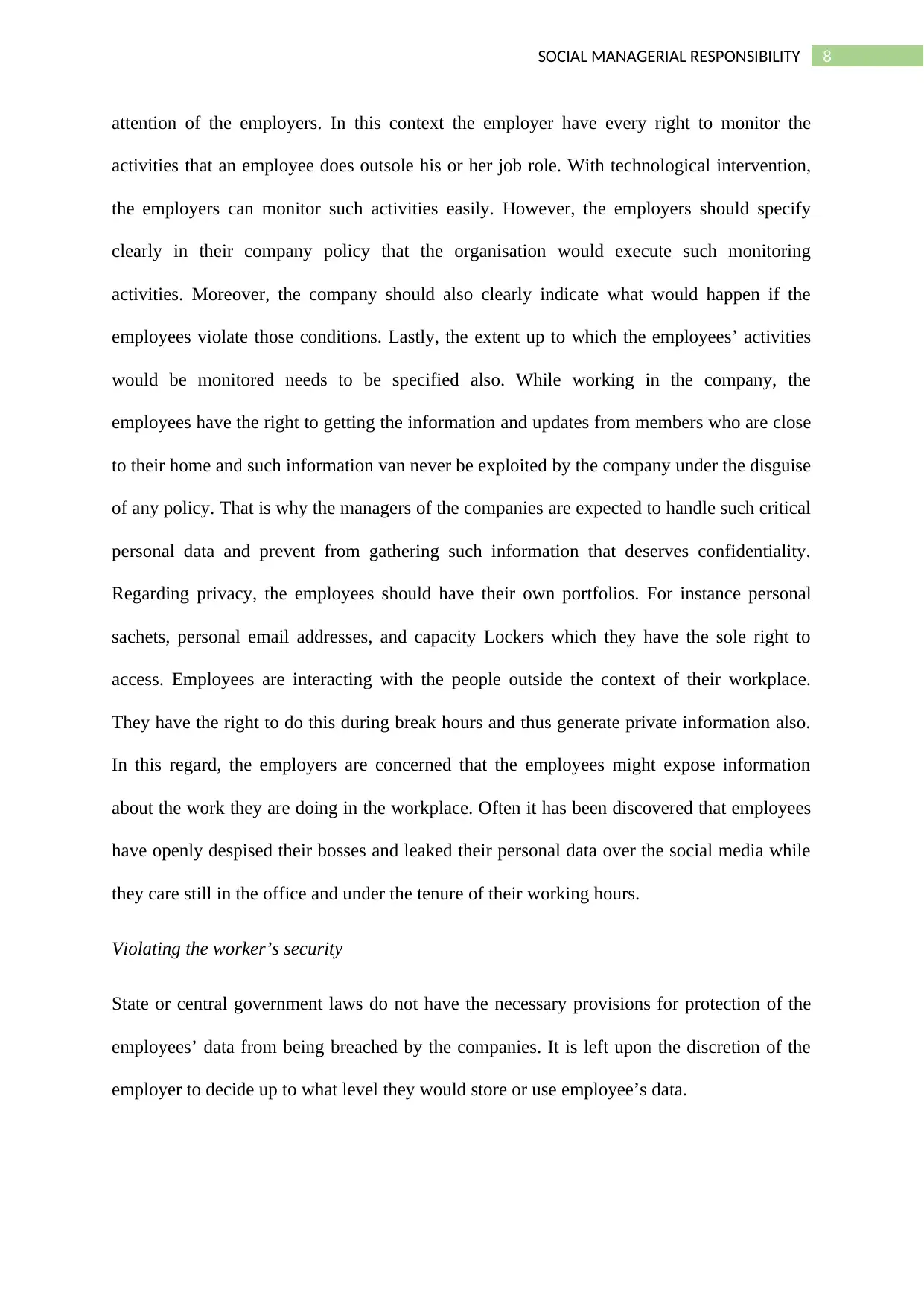
8SOCIAL MANAGERIAL RESPONSIBILITY
attention of the employers. In this context the employer have every right to monitor the
activities that an employee does outsole his or her job role. With technological intervention,
the employers can monitor such activities easily. However, the employers should specify
clearly in their company policy that the organisation would execute such monitoring
activities. Moreover, the company should also clearly indicate what would happen if the
employees violate those conditions. Lastly, the extent up to which the employees’ activities
would be monitored needs to be specified also. While working in the company, the
employees have the right to getting the information and updates from members who are close
to their home and such information van never be exploited by the company under the disguise
of any policy. That is why the managers of the companies are expected to handle such critical
personal data and prevent from gathering such information that deserves confidentiality.
Regarding privacy, the employees should have their own portfolios. For instance personal
sachets, personal email addresses, and capacity Lockers which they have the sole right to
access. Employees are interacting with the people outside the context of their workplace.
They have the right to do this during break hours and thus generate private information also.
In this regard, the employers are concerned that the employees might expose information
about the work they are doing in the workplace. Often it has been discovered that employees
have openly despised their bosses and leaked their personal data over the social media while
they care still in the office and under the tenure of their working hours.
Violating the worker’s security
State or central government laws do not have the necessary provisions for protection of the
employees’ data from being breached by the companies. It is left upon the discretion of the
employer to decide up to what level they would store or use employee’s data.
attention of the employers. In this context the employer have every right to monitor the
activities that an employee does outsole his or her job role. With technological intervention,
the employers can monitor such activities easily. However, the employers should specify
clearly in their company policy that the organisation would execute such monitoring
activities. Moreover, the company should also clearly indicate what would happen if the
employees violate those conditions. Lastly, the extent up to which the employees’ activities
would be monitored needs to be specified also. While working in the company, the
employees have the right to getting the information and updates from members who are close
to their home and such information van never be exploited by the company under the disguise
of any policy. That is why the managers of the companies are expected to handle such critical
personal data and prevent from gathering such information that deserves confidentiality.
Regarding privacy, the employees should have their own portfolios. For instance personal
sachets, personal email addresses, and capacity Lockers which they have the sole right to
access. Employees are interacting with the people outside the context of their workplace.
They have the right to do this during break hours and thus generate private information also.
In this regard, the employers are concerned that the employees might expose information
about the work they are doing in the workplace. Often it has been discovered that employees
have openly despised their bosses and leaked their personal data over the social media while
they care still in the office and under the tenure of their working hours.
Violating the worker’s security
State or central government laws do not have the necessary provisions for protection of the
employees’ data from being breached by the companies. It is left upon the discretion of the
employer to decide up to what level they would store or use employee’s data.
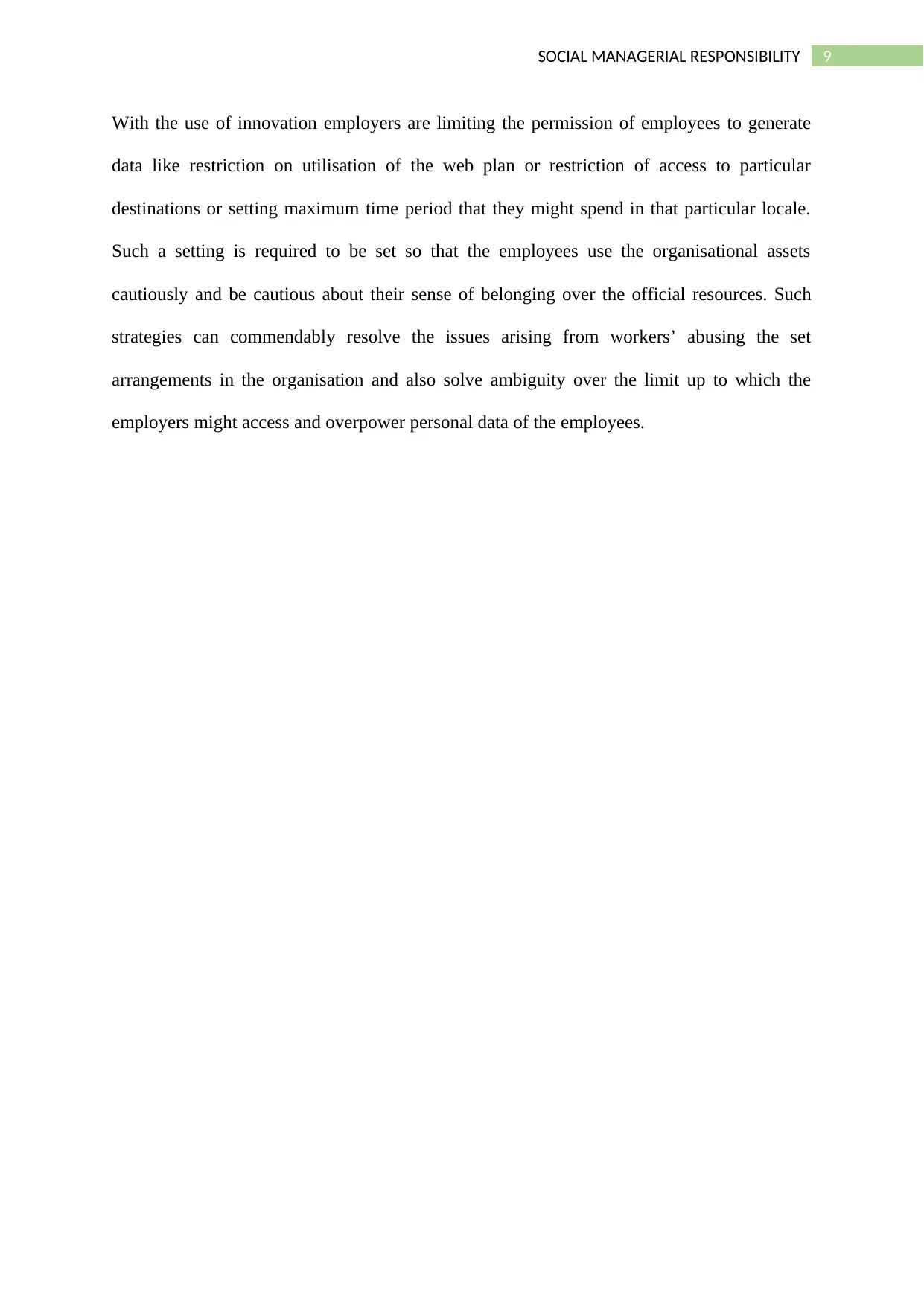
9SOCIAL MANAGERIAL RESPONSIBILITY
With the use of innovation employers are limiting the permission of employees to generate
data like restriction on utilisation of the web plan or restriction of access to particular
destinations or setting maximum time period that they might spend in that particular locale.
Such a setting is required to be set so that the employees use the organisational assets
cautiously and be cautious about their sense of belonging over the official resources. Such
strategies can commendably resolve the issues arising from workers’ abusing the set
arrangements in the organisation and also solve ambiguity over the limit up to which the
employers might access and overpower personal data of the employees.
With the use of innovation employers are limiting the permission of employees to generate
data like restriction on utilisation of the web plan or restriction of access to particular
destinations or setting maximum time period that they might spend in that particular locale.
Such a setting is required to be set so that the employees use the organisational assets
cautiously and be cautious about their sense of belonging over the official resources. Such
strategies can commendably resolve the issues arising from workers’ abusing the set
arrangements in the organisation and also solve ambiguity over the limit up to which the
employers might access and overpower personal data of the employees.
⊘ This is a preview!⊘
Do you want full access?
Subscribe today to unlock all pages.

Trusted by 1+ million students worldwide
1 out of 9
Related Documents
Your All-in-One AI-Powered Toolkit for Academic Success.
+13062052269
info@desklib.com
Available 24*7 on WhatsApp / Email
![[object Object]](/_next/static/media/star-bottom.7253800d.svg)
Unlock your academic potential
Copyright © 2020–2026 A2Z Services. All Rights Reserved. Developed and managed by ZUCOL.





